EXPLAINED: Where fireworks are allowed in Germany this New Year's Eve
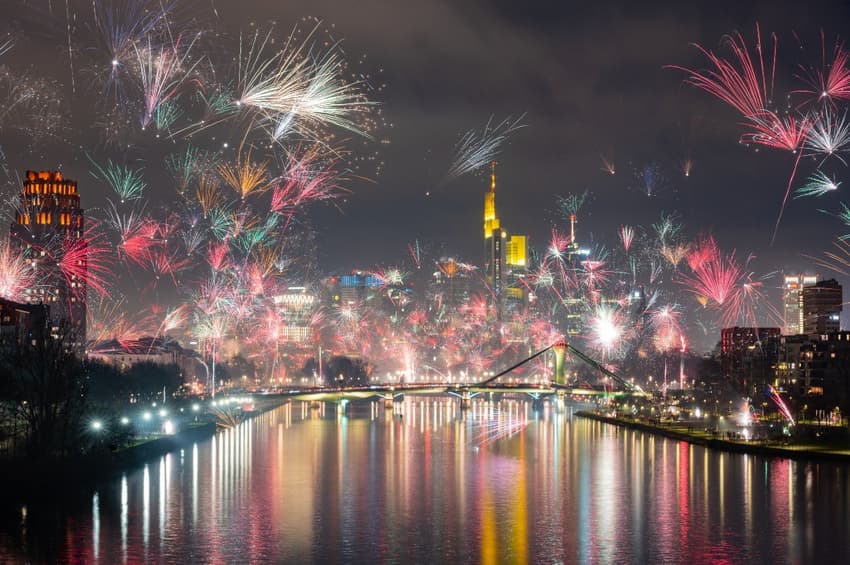
The Covid pandemic forced Germany to put aside one of its most beloved New Year's traditions: setting off an arsenal of fireworks. This year they're set to return to many regions - though restrictions are still in place. Here's what you need to know.
What's going on?
For the last two years, Germany was unusually quiet on New Year's Eve. To protect hospitals during the Covid-19 pandemic, there was a nationwide ban on purchasing and setting off fireworks at the turn of the year.
In most years before that, the German passion for pyrotechnics on Silvester (New Year's Eve) had led to a spike in accidents and injuries on the 31st. Combined with drink-related accidents, it meant that staff in A&E wards and other emergency services often faced their busiest night of the year.
Though not everyone stuck to the ban in 2020/21 and 2021/22, many hoped that banning fireworks would take pressure off health services that were already overwhelmed by the pandemic.
READ ALSO: Why many German cities become a fireworks hell on NYE
This year, as everything returns to normal, there has been fierce debate in the run-up to Silvester on whether to return to the pre-Covid status quo. Though all but a few pandemic restrictions have gone, emergency services have been calling on the government to tighten up the usual permissive firework laws.
As a compromise, the federal government has decided to leave it up to the states this year. So while there's no longer a nationwide ban, people will have to navigate certain rules and restrictions if they want to set off a firecracker or two.
Can people still buy fireworks in the shops?
Yes. Supermarkets and discounters are allowed to sell fireworks once again, but only from December 29th until the 31st. The safest bets for picking up your stash are Lidl, Aldi, Penny and Kaufland, according to German media. For anyone worried about shops running out, Lidl is permitting customers to reserve fireworks via the Lidl Plus app.
READ ALSO: 10 ways to celebrate this New Year's Eve like a German
The Hessischen/Niedersächsischen Allgemeine also reports that Rewe and Edeka will be selling fireworks, but not in all stores. Each shop will be able to decide for themselves. Meanwhile, major hardware stores like OBI and Bauhaus have confirmed they won't have any pyrotechnics in stock.
Where are fireworks forbidden this year?
Although there isn't a Germany-wide ban on firecrackers this year, certain areas will still be off-limits for fireworks on December 31st. The general rule is that pyrotechnics must not be set off in the immediate vicinity of churches, hospitals, children's homes, old people's homes and buildings that are particularly sensitive to fire.
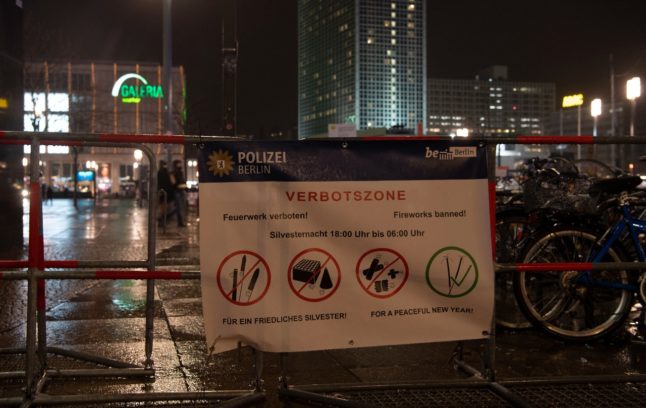
A prohibited zone at Berlin Alexanderplatz. Photo: picture alliance/dpa | Paul Zinken
Some cities also want to set up firecracker-free zones. Here's an overview of the plans across the states.
Bavaria
In several major Bavarian cities, fireworks are to be banned again this year on New Year's Eve - at least in the central areas.
In Munich, for example, fireworks will not be allowed in the city centre (within the Mittlere Ring), while in Nuremberg, prohibited zones in the area around the Hauptmarkt and Kaiserburg castles will remain in place "for the safety of the crowds there and of buildings protected by law".
In Regensburg, a ban on firecrackers is to apply in the entire old town on New Year's Eve. In Augsburg, too, firecrackers are not allowed in the immediate vicinity of so-called protected objects like hospitals and churches. There has been a ban on setting off fireworks in crowded public spaces in Augsburg on New Year's Eve since 2017.
Baden-Württemberg
Following the ban on fireworks over the last two years, Baden-Württemberg's state government has decided not to impose restrictions on New Year's Eve, though some cities have put their own rules in place.
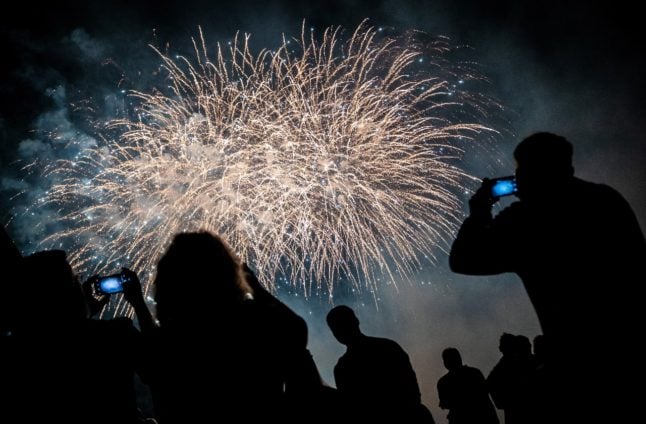
Fireworks go off at the the International Firework Festival "Flammenden Sterne" in Ostfildern, Baden-Württemberg. Photo: picture alliance/dpa | Christoph Schmidt
This includes a ban on fireworks in Tübingen's Old Town and a similar ban in Stuttgart. On the flip side, people will be able to set off explosives to their heart's content in Ulm, Mannheim, Heidelberg, Karlsruhe and Freiburg - though not near protected spaces like nursing homes.
Berlin
Most neighbourhoods in Berlin are likely to resemble a war zone this New Year's Eve - though three key firework-free zones will remain in place:
- Alexanderplatz, the areas around Berolinahaus, Alexanderhaus, Alexanderplatz 3, 7 and 9 and the construction area on the square are listed as prohibited zones.
- In Schöneberg's Steinmetzkiez, firecrackers are not allowed on parts of Winterfeldtstraße, Potsdamer Straße, Steinmetzstraße, Alvenslebenstraße and Pallasstraße.
- In Moabit, firecrackers are banned from Rathenower Strasse to Seydlitzstrasse, including the adjacent green area, as well as sections of Otto-Dix-Strasse, Alt-Moabit Strasse next to the prison, and sections of Paulstrasse, Spenerstrasse and Calvinstrasse near the prison.
To enforce the ban, police will cordon off these areas and check people's bags as they enter. It will also be forbidden to set off fireworks at the big public celebration on Pariser Platz near Brandenburg Gate.
READ ALSO: Berlin New Year's Eve air quality 'worst in Germany'
Brandenburg
Towns and cities in Brandenburg have said they aren't planning to put any strict bans on fireworks in place this year. Officials in Potsdam, Oranienburg and Frankfurt (Oder) all confirmed in recent days that people will once again be allowed to set off their firecrackers in the streets.
Bremen
In Bremen, the ban on firecrackers near the Weserpromenade - which came into force in 2020/2021 - will remain in place this year. In addition, fireworks are banned near historic monuments such as the market square or the Schnoor district.
Hamburg
Fireworks are set to return to the streets of Hamburg this year, but they won't be permitted everywhere.
A ban will be in place around the Binnenalster lake and at the Rathausmarkt. Specifically, Jungfernstieg, Neuer Jungfernstieg, Lombardsbrücke, Ballindamm, and Reesendamm will all be off-limits for potential fire-starters - as well as the central square itself.
However, firecrackers and sparklers will still be allowed, according to authorities.
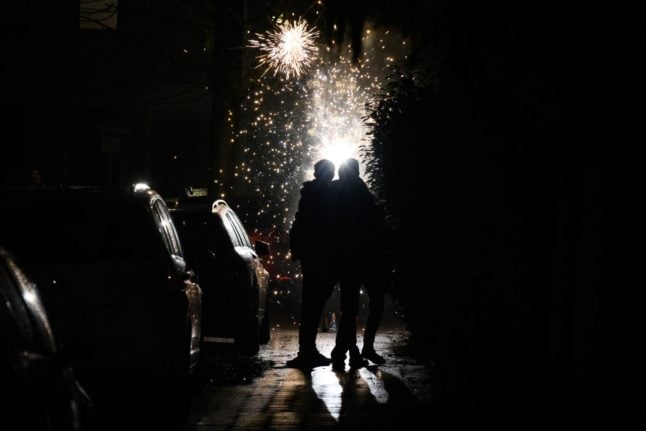
Fireworks go off in the streets of Hamburg on New Year's Eve 2021/22. Photo: picture alliance/dpa | Jonas Walzberg
Hesse
Frankfurt am Main will also be lit up with fireworks once again on the 31st, but a special firework-free zone will be apply to the Eiserner Steg between 9pm and 3am on New Year's Eve.
That means that revellers on the Iron Bridge can still enjoy small pyrotechnics like sparklers and firecrackers, but anything bigger is strictly forbidden.
There will also be a weapons ban on public transport both in Frankfurt and the wider area, which police say should help avoid alcohol-related brawls escalating into even more dangerous situations.
READ ALSO: IN PICS: Berlin brings in 2020 with fireworks and winter bathing
Lower Saxony
Hanover will once again be putting some firework-free zones in place in the city centre this year. The prohibited zone extends from Opernplatz to Kröpcke, Karmarschstraße to Platz der Weltausstellung, Georgstraße to Steintor and also includes Bahnhofstraße, Ernst August Platz and the area of Raschplatz.
In Braunschweig, Oldenburg, Celle and Göttingen, no further bans are planned outside of the basic ban on setting off fireworks near protected areas like churches, hospitals, care homes and fire-sensitive buildings.
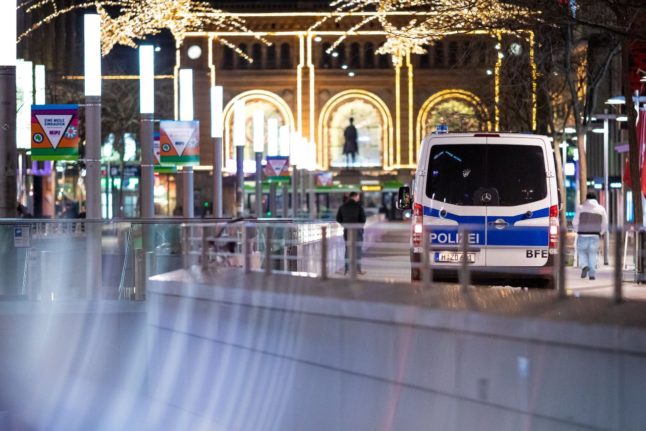
Police patrol central Hanover to ensure that people don't let off fireworks on NYE. Photo: picture alliance/dpa | Moritz Frankenberg
Mecklenburg Western-Pomerania
In the northeastern state of Mecklenburg, the authorities have also rejected a state-wide ban.
Rostock, Schwerin, Greifswald, Stralsund, Wismar and Neubrandenburg have so far only planned to enforce restrictions in the usual protected areas such as churches, hospitals and nursing homes.
North-Rhine Westphalia
Several cities in Germany's most populous state will be putting special firework-free zones in place this year, though pyrotechnics will be generally permitted.
In Cologne, the prohibited zone will be modelled on previous years and include a fireworks-free zone around the Dom from 6pm until 5am. Between 10pm and 2am, the fireworks-free zone will be extended to other parts of the city center: on Komödienstrasse/Marzellenstrasse, Andreaskloster, Burgmauer and the corner of Trankgasse/Kardinal-Höffner-Platz, fireworks, firecrackers, rockets and sparklers will also be prohibited.
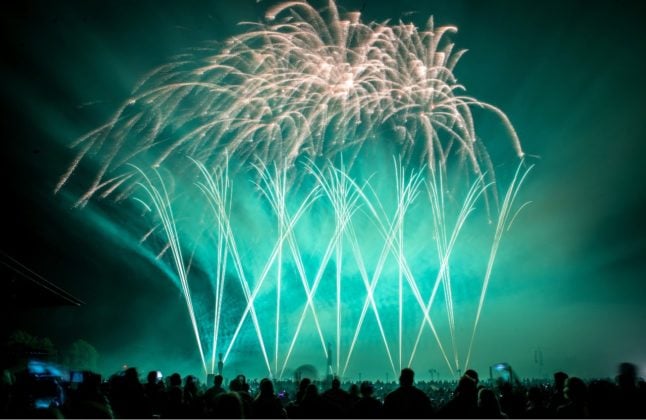
Fireworks go off at the the international firework festival "Flammenden Sterne" in Ostfildern, Baden-Württemberg. Photo: picture alliance/dpa | Christoph Schmidt
Meanwhile in Düsseldorf, fireworks are to be banned in the Old Town from 8pm on New Year's Eve until 6am on New Year's Day. Authorities say they're hoping to prevent avoidable injuries.
The smaller cities of Essen, Duisburg and Bochum will only restrict fireworks in general protected areas. However, Dortmund plans to implement a prohibited zone around Reinoldikirche and the Hauptbahnhof.
Saxony
Saxony is taking a laissez-faire stance towards fireworks again this year, as major cities like Dresden and Leipzig say they aren't planning any specific restrictions.
Saxony-Anhalt
In Saxony-Anhalt, firecrackers can be set off largely without restrictions this New Year's Eve. As things stand at present, the state's largest cities - including Magdeburg, Halle and Dessau - do not intend to set up any prohibited zones.
Comments
See Also
What's going on?
For the last two years, Germany was unusually quiet on New Year's Eve. To protect hospitals during the Covid-19 pandemic, there was a nationwide ban on purchasing and setting off fireworks at the turn of the year.
In most years before that, the German passion for pyrotechnics on Silvester (New Year's Eve) had led to a spike in accidents and injuries on the 31st. Combined with drink-related accidents, it meant that staff in A&E wards and other emergency services often faced their busiest night of the year.
Though not everyone stuck to the ban in 2020/21 and 2021/22, many hoped that banning fireworks would take pressure off health services that were already overwhelmed by the pandemic.
READ ALSO: Why many German cities become a fireworks hell on NYE
This year, as everything returns to normal, there has been fierce debate in the run-up to Silvester on whether to return to the pre-Covid status quo. Though all but a few pandemic restrictions have gone, emergency services have been calling on the government to tighten up the usual permissive firework laws.
As a compromise, the federal government has decided to leave it up to the states this year. So while there's no longer a nationwide ban, people will have to navigate certain rules and restrictions if they want to set off a firecracker or two.
Can people still buy fireworks in the shops?
Yes. Supermarkets and discounters are allowed to sell fireworks once again, but only from December 29th until the 31st. The safest bets for picking up your stash are Lidl, Aldi, Penny and Kaufland, according to German media. For anyone worried about shops running out, Lidl is permitting customers to reserve fireworks via the Lidl Plus app.
READ ALSO: 10 ways to celebrate this New Year's Eve like a German
The Hessischen/Niedersächsischen Allgemeine also reports that Rewe and Edeka will be selling fireworks, but not in all stores. Each shop will be able to decide for themselves. Meanwhile, major hardware stores like OBI and Bauhaus have confirmed they won't have any pyrotechnics in stock.
Where are fireworks forbidden this year?
Although there isn't a Germany-wide ban on firecrackers this year, certain areas will still be off-limits for fireworks on December 31st. The general rule is that pyrotechnics must not be set off in the immediate vicinity of churches, hospitals, children's homes, old people's homes and buildings that are particularly sensitive to fire.

Some cities also want to set up firecracker-free zones. Here's an overview of the plans across the states.
Bavaria
In several major Bavarian cities, fireworks are to be banned again this year on New Year's Eve - at least in the central areas.
In Munich, for example, fireworks will not be allowed in the city centre (within the Mittlere Ring), while in Nuremberg, prohibited zones in the area around the Hauptmarkt and Kaiserburg castles will remain in place "for the safety of the crowds there and of buildings protected by law".
In Regensburg, a ban on firecrackers is to apply in the entire old town on New Year's Eve. In Augsburg, too, firecrackers are not allowed in the immediate vicinity of so-called protected objects like hospitals and churches. There has been a ban on setting off fireworks in crowded public spaces in Augsburg on New Year's Eve since 2017.
Baden-Württemberg
Following the ban on fireworks over the last two years, Baden-Württemberg's state government has decided not to impose restrictions on New Year's Eve, though some cities have put their own rules in place.

This includes a ban on fireworks in Tübingen's Old Town and a similar ban in Stuttgart. On the flip side, people will be able to set off explosives to their heart's content in Ulm, Mannheim, Heidelberg, Karlsruhe and Freiburg - though not near protected spaces like nursing homes.
Berlin
Most neighbourhoods in Berlin are likely to resemble a war zone this New Year's Eve - though three key firework-free zones will remain in place:
- Alexanderplatz, the areas around Berolinahaus, Alexanderhaus, Alexanderplatz 3, 7 and 9 and the construction area on the square are listed as prohibited zones.
- In Schöneberg's Steinmetzkiez, firecrackers are not allowed on parts of Winterfeldtstraße, Potsdamer Straße, Steinmetzstraße, Alvenslebenstraße and Pallasstraße.
- In Moabit, firecrackers are banned from Rathenower Strasse to Seydlitzstrasse, including the adjacent green area, as well as sections of Otto-Dix-Strasse, Alt-Moabit Strasse next to the prison, and sections of Paulstrasse, Spenerstrasse and Calvinstrasse near the prison.
To enforce the ban, police will cordon off these areas and check people's bags as they enter. It will also be forbidden to set off fireworks at the big public celebration on Pariser Platz near Brandenburg Gate.
READ ALSO: Berlin New Year's Eve air quality 'worst in Germany'
Brandenburg
Towns and cities in Brandenburg have said they aren't planning to put any strict bans on fireworks in place this year. Officials in Potsdam, Oranienburg and Frankfurt (Oder) all confirmed in recent days that people will once again be allowed to set off their firecrackers in the streets.
Bremen
In Bremen, the ban on firecrackers near the Weserpromenade - which came into force in 2020/2021 - will remain in place this year. In addition, fireworks are banned near historic monuments such as the market square or the Schnoor district.
Hamburg
Fireworks are set to return to the streets of Hamburg this year, but they won't be permitted everywhere.
A ban will be in place around the Binnenalster lake and at the Rathausmarkt. Specifically, Jungfernstieg, Neuer Jungfernstieg, Lombardsbrücke, Ballindamm, and Reesendamm will all be off-limits for potential fire-starters - as well as the central square itself.
However, firecrackers and sparklers will still be allowed, according to authorities.

Hesse
Frankfurt am Main will also be lit up with fireworks once again on the 31st, but a special firework-free zone will be apply to the Eiserner Steg between 9pm and 3am on New Year's Eve.
That means that revellers on the Iron Bridge can still enjoy small pyrotechnics like sparklers and firecrackers, but anything bigger is strictly forbidden.
There will also be a weapons ban on public transport both in Frankfurt and the wider area, which police say should help avoid alcohol-related brawls escalating into even more dangerous situations.
READ ALSO: IN PICS: Berlin brings in 2020 with fireworks and winter bathing
Lower Saxony
Hanover will once again be putting some firework-free zones in place in the city centre this year. The prohibited zone extends from Opernplatz to Kröpcke, Karmarschstraße to Platz der Weltausstellung, Georgstraße to Steintor and also includes Bahnhofstraße, Ernst August Platz and the area of Raschplatz.
In Braunschweig, Oldenburg, Celle and Göttingen, no further bans are planned outside of the basic ban on setting off fireworks near protected areas like churches, hospitals, care homes and fire-sensitive buildings.

Mecklenburg Western-Pomerania
In the northeastern state of Mecklenburg, the authorities have also rejected a state-wide ban.
Rostock, Schwerin, Greifswald, Stralsund, Wismar and Neubrandenburg have so far only planned to enforce restrictions in the usual protected areas such as churches, hospitals and nursing homes.
North-Rhine Westphalia
Several cities in Germany's most populous state will be putting special firework-free zones in place this year, though pyrotechnics will be generally permitted.
In Cologne, the prohibited zone will be modelled on previous years and include a fireworks-free zone around the Dom from 6pm until 5am. Between 10pm and 2am, the fireworks-free zone will be extended to other parts of the city center: on Komödienstrasse/Marzellenstrasse, Andreaskloster, Burgmauer and the corner of Trankgasse/Kardinal-Höffner-Platz, fireworks, firecrackers, rockets and sparklers will also be prohibited.

Meanwhile in Düsseldorf, fireworks are to be banned in the Old Town from 8pm on New Year's Eve until 6am on New Year's Day. Authorities say they're hoping to prevent avoidable injuries.
The smaller cities of Essen, Duisburg and Bochum will only restrict fireworks in general protected areas. However, Dortmund plans to implement a prohibited zone around Reinoldikirche and the Hauptbahnhof.
Saxony
Saxony is taking a laissez-faire stance towards fireworks again this year, as major cities like Dresden and Leipzig say they aren't planning any specific restrictions.
Saxony-Anhalt
In Saxony-Anhalt, firecrackers can be set off largely without restrictions this New Year's Eve. As things stand at present, the state's largest cities - including Magdeburg, Halle and Dessau - do not intend to set up any prohibited zones.
Join the conversation in our comments section below. Share your own views and experience and if you have a question or suggestion for our journalists then email us at [email protected].
Please keep comments civil, constructive and on topic – and make sure to read our terms of use before getting involved.
Please log in here to leave a comment.